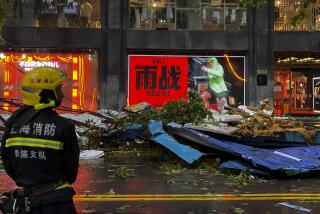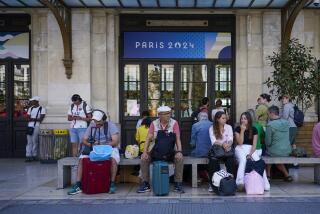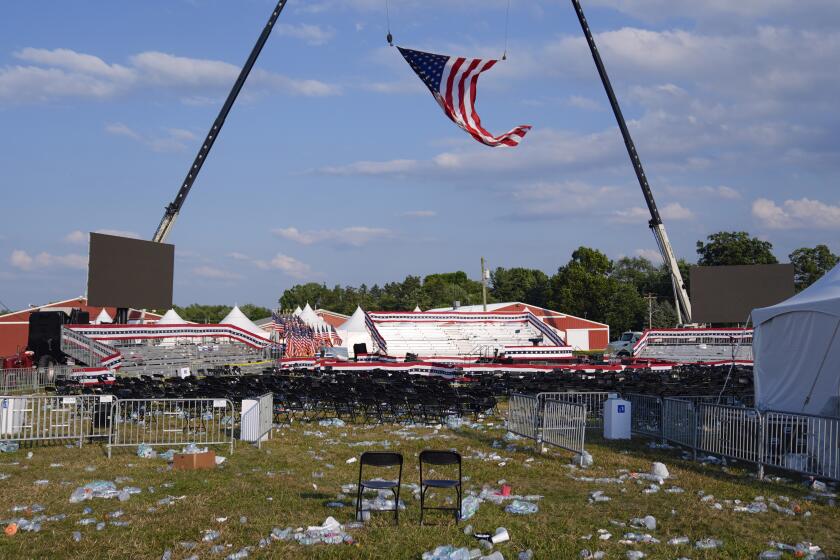China’s high-speed rail glitches: Racing to make errors?
China’s high-speed rail line between Beijing and Shanghai has been beset by glitches in the two weeks since it opened to great fanfare on the eve of the Chinese Communist Party’s 90th anniversary celebration.
In the first incident, a short-circuit delayed 19 trains in Shandong province on Sunday, knocking out air-conditioning and leaving passengers sweltering inside the luxury cars for hours.
On Tuesday, another power outage brought 30 trains to a temporary halt. And on Wednesday, a transformer malfunction slowed a train to half its top speed, forcing passengers onto a backup train.
Though officials blamed thunderstorms and wind for the problems, the delays add to the suspicion that so-called face projects had been rushed in China to open in time for the party’s anniversary on July 1.
The projects include the world’s longest sea bridge, which opened June 30 in the northeastern city of Qingdao without lights and guardrails in some sections. A China Central Television reporter inspecting the 26-mile Jiaozhou Bay Bridge found nut caps loosely fastened into existing guardrails. Construction workers told the state broadcaster that they still needed two months to complete the span.
In another controversy, workers rushed to install temporary granite flooring in the newly built Nanjing South Railway Station to meet the anniversary deadline. Ten days later, they were seen tearing up the tiles in the state-of-the-art station, said to be the biggest in the world at nearly 5 million square feet.
The renovations will cost about $1.5 million, a fraction of the super-structure’s total $1-billion price tag.
Cities and ministries often present gifts on important dates to bestow respect and legitimacy to leaders. The tradition dates to imperial times and has not been lost under communism. It is not unusual for China to unveil its latest weapons on Oct. 1, the country’s National Day.
The party’s 90th anniversary was a particularly significant event that has been marked by large galas, a spike in travel to communist battle sites and the revival of revolutionary music known as red songs. It made for a unique set of pressures for construction workers who had to meet the deadline.
“Other countries don’t have these political issues,” said Zhao Jian, a professor at Beijing Jiaotong University and a longtime critic of China’s high-speed rail program. “But a lot of other projects are rushed too so they can make profits.”
The string of incidents in recent days has generated no shortage of ridicule online.
“The Jiaozhou bridge started operating when it’s still incomplete; Nanjing South Railway Station continued construction after it was opened; what are we rushing for? Are our hormones still normal in these days of red songs?” wrote Fan Jisheng on Sina Weibo, the country’s wildly popular micro-blogging service.
A video shot by a passenger of a weeping attendant on one of the bullet trains stranded on Sunday has gone viral. The rail employee was shown being surrounded by angry travelers, one of whom was berating her for crying. “You can’t try to solve the problems with your tears,” the passenger said.
The rail mishaps are particularly embarrassing because the $32.5-billion project was considered the crown jewel in China’s ambitious high-speed network. The Ministry of Rail had already come under fire for a massive corruption scandal this year over alleged safety flaws and high-priced tickets.
It did not help that a spokesman for the ministry boasted last week that China’s new trains were superior to Japan’s. The comment was in response to threats by Japanese companies to sue if China patented high-speed rail technology they believe originated in Japan.
The breakdowns this week no doubt elicited a level of schadenfreude in the Japanese media, something that wasn’t lost on rail ministry spokesman Wang Yongping in an online chat with the public Thursday.
“We welcome foreign media’s good-natured criticism and reasonable suggestions, but are sad that some media outlets are gloating,” Wang said. “They should make sure they are taking care of their own business before they make these sorts of comments.”
More to Read
Sign up for Essential California
The most important California stories and recommendations in your inbox every morning.
You may occasionally receive promotional content from the Los Angeles Times.










